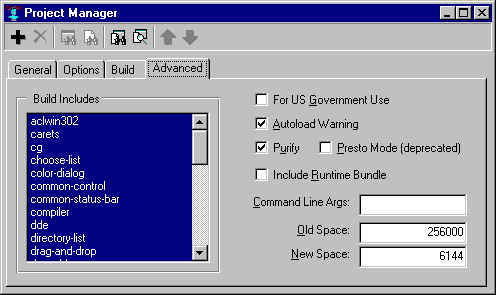Project Manager Advanced Tab

The Advanced Tab of the Project Manager Dialog displays
certain advanced options for the application associated with the
project. The options and controls are:
-
For US Government Use: check this if the application will be
supplied to the US Government or someone working for the US Government
(and the application is in connection with that person's work). If
this box is checked, the copyright notice will include language that
protects the rights of software vendors (the application developer and
Franz Inc.) when supplying the US Government. That is the only effect
of selecting this option. Note that it is not necessary to select this
option when supplying a government of any country other than the
United States or supplying a state or local government in the United
States.
-
Autoload warning: If checked, the autoload warning dialog will
be displayed when a project build is complete. If unchecked, it will
not be displayed. (Not displayed it facilitates batch processing.)
See autoload-warning.
-
Purify: Specifies whether to move strings and code vectors that would
otherwise be in the generated .dxl image file into a separate .pll
library file, which is sharable by multiple lisp
applications. (Checking this box is equivalent to specifying the
purify argument to generate-application true.)
-
Presto Mode: if this option is checked, the application will run in
Presto Mode. Note that use of Allegro Presto is deprecated. In this
mode, when a fasl (compiled lisp) file is loaded, function definitions
will be loaded as stubs. The full function definition will only be
loaded when the function is actually called (and the load then will be
automatic). This results in smaller images at the cost of slightly
longer run time when functions are first called and somewhat more
complicated file management -- the file containing the complete
function definition must be available at run time. See The Allegro Presto
Algorithm in loading.htm.
-
Command Line Args: specifies default command line arguments
(such as +c -foo) that will be passed to the generated executable
automatically; see default-command-line-arguments.
-
Old Space: specifies the size of the initial oldspace in the
application. The oldspace will grow automatically as needed but
specifying a suitable value can improve garbage collection
performance. See gc.htm for more information on oldspace size
and garbage collection.
-
New Space: specifies the size of the initial newspace in the
application. The newspace will grow automatically as needed but
specifying a suitable value can improve garbage collection
performance. See gc.htm for more information on newspace size
and garbage collection.
-
Include Runtime Bundle: Specifies whether the
runtime-bundle argument to generate-application should be specified true
(checked) or not (unchecked). When that argument is true, a
runtime-suitable bundle file (containing modules permitted in a
runtime image but not loaded into the image as built) will be included
in the distribution directory. See Including all desired modules in
delivery.htm for more information.
-
Build Includes: this multi-item list identifies many modules
providing functionality in Allegro CL and potentially in applications
built with Allegro CL. However, if an application makes no use of
certain functionality, then it can be left out of the application
image. You can choose what functionality to leave out. Highlighted
(usually dark background with white letters) means include,
unhighlighted means leave out. Several things are left out
initially. Be sure that functionality is not needed before choosing to
leave it out. Modules in an image are in the list that is the value of
*modules*. Note that
source-file-info and xref-info are not on the list (those modules
should not be in a runtime image but appeared on the list in earlier
releases). Note too the local-name-info module: if it is chosen, then
local variable names will not be discarded from the code in the
generated application. Local variable names take up space but help
with debugging. See runtime-modules and include-flags.
See the general description of the
Project Manager Dialog for
details of the toolbar buttons.
Copyright (c) 1998-2002, Franz Inc. Oakland, CA., USA. All rights reserved.
Documentation for Allegro CL version 6.2. This page has had minimal revisions compared to the 6.1 page.
Created 2002.2.26.

